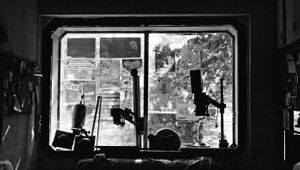
Dream Teams: How 'Milton & Jones' Use Healthy Disagreement to Avoid Creative Echo Chambers

Left to right: Milton Correa and Jones Krahl
---
Milton & Jones may sound like the name of a classic London retailer that specialises in those kinds of umbrellas with hand-carved, sheened wooden handles, but it’s actually the moniker of Milton Correa and Jones Krahl, co-heads of creative for brand and advertising at Deloitte Digital in the US.
The Brazilian duo’s paths first crossed at a Ramones gig in São Paulo when they were teenagers, but they didn’t officially meet until some years later - at an ad agency in New York. Milton, the art director in the relationship, was already in the city working when his ECD at the time asked how he’d feel about working with a Brazilian copywriter. “My answer: ‘Can I see his book?” says Milton. “And here we are 15 years later and going strong.”
“As the copywriter of the duo,” adds Jones, “my first impression was that his English was so much better than mine! I think it still is.”
Milton and Jones’ first project together was a fairly significant one - the rebranding of software giant IBM and the launch of its ‘Smarter Planet’ business strategy and marketing campaign amidst the global financial crisis of 2008. “To this day,” says Jones, “that was the campaign that helped shape me as a creative problem-solver the most.”
Both believe that when it comes to creative problem-solving, from that first project with IBM to today at Deloitte Digital, each is aligned with the other with a healthy mix of agreement and constructive pushback. “We have a very similar creative criteria,” says Milton. “And after all these years have already gotten to the state where it’s not uncommon to finish each other’s…”
“Sentences,” jokes Jones. “What’s more, we have absolute alignment when it comes to creative ambition and passion for the work. Our personalities are very similar, but they rarely clash. Quite the opposite. We have a lot of overlap in craft. For example, Milton has a unique ability to come up with one-liners that can shape the whole idea.
When it comes to creative differences, the pair share a view that a little disagreement is healthy to avoid the comfort or inertia that a longstanding relationship could nurture. Always keep each other accountable, be inquisitive about ideas, and keep questioning each other’s opinions are three rules that inform this side of their work.
“Our rule of thumb,” says Milton, “is to always disagree our way to a consensus, not a compromise.”
“We’re in the business of selling emotion,” adds Jones. “It’s sometimes impossible to keep it out of the creative process. But if being together for 15 years proves anything, it is that our disagreements have always led to a better consensus - which improves the work, not the ego.”
A recent project that involved notable teamwork to overcome creative challenges was their ‘InsurAAAnce Rickroll’ campaign for the insurance group CSAA. Their idea required some bold pitching to the client, not least because the core of it involved completely unbranded ads that featured only a QR code or bit.ly URL. What’s more, they needed to get Rick Astley involved and obsessively recreate a homage to the music video for ‘Never Gonna Give You Up’. “With all that,” say the pair, “we had just a few hours of Rick on set for one day (he even broke from set to sing at a sold-out concert and came back late at night). All-in-all, it was a campaign that was proportionally as challenging as it was rewarding.”
Milton and Jones believe that their best work has always combined storytelling and experience, such as Coke Zero’s ‘Drinkable Advertising’. “It’s still our best and most challenging example of that intersection,” they say. “This digital concept managed to make hundreds of thousands of TVs pour a virtual drink in real-time straight into people’s phones.”
They are wary of claiming they socialise ‘outside of work’ because conversation naturally veers towards work or at least inspiration and insights in a similar realm. But they do hang out off the clock, and their kids are school buddies who study in the very same classroom.
As for work, Milton and Jones have been relishing the synchronicity and scale that being a part of a true partnership offers for the past 15 years, and see many more ahead. “[It’s] not the kind of synchronicity that leads to conformed thinking,” says Milton, “but that modulates normal tensions in the creative process into a smoother flow while generating more kinetic energy to push ahead bold ideas. And being a duo, beyond leading, you can be more actively hands-on crafting the creative work — being able to always be a maker before a manager.
“To me,” adds Jones, “it’s having that sounding board that isn’t afraid to keep things honest. As creatives, we get precious about our ideas and you can’t improve the work with an echo chamber.”















